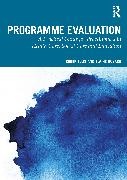Read more
This book offers a comprehensive, practice-based introduction to conducting effective programme evaluations. It presents the Trident Approach, a three-prong framework focused on outcomes, processes, and stakeholder perspectives that supports robust, real-world evaluations.
Designed for practitioners, policy professionals, managers, and students, this guide walks readers through every stage of the evaluation lifecycle-from identifying needs and formulating questions, to gathering credible data and communicating actionable findings. The book balances methodological guidance with practical tools, case examples, and insights drawn from real evaluation practice. Whether you're seeking to improve service quality, meet accountability demands, fulfil accreditation requirements, or influence policy, this book equips you to conduct evaluations that are credible, useful, and grounded in everyday professional contexts. More than just a technical manual, it fosters a reflective mindset-one committed to learning, integrity, and positive change.
Program Evaluation: A Practical Guide for Practitioners in Health Care, Social Care and Education is an essential resource for those who wish to use evaluation to generate insight, foster improvement, encourage continuous quality improvement, and support evidence-informed practice.
List of contents
A Trident of Acknowledgements, 1. Introduction, 2. The Life History of a Programme Evaluation: A Practical Guide from a Case Study of a Complex Multi-site Community Programme, 3. The Trident: Implementing the Evaluation Trident using a Case Study in the Development of a New Healthcare Support Role, 4. Establishing the Starting Point of a Programme Evaluation, 5. Preliminary Questions: Framing a Programme Evaluation of a Community Safety Initiative with Exploratory Questions & Considerations, 6. The Steering Group and Partnership: How to Build Effective Partnerships Between Evaluators and Program Stakeholders in Program Evaluation, 7. Evaluation Questions and Data Streams: Structuring Inquiry Through the Trident Evaluation Model, 8. Overall Design and Structure: The Evaluation Trident and Connections, 9. Project Management and responsibilities: A Practical Guide to Structuring and Delivering Effective Evaluations with a case study of a community partnership service, 10. Determining Outcomes With A Case Study Of the Evaluation Of Midwifery In Community Health, 11. Process: Capturing, Recording, and Analysing Process in Programme Evaluation with a case study of a Mental Healthcare Collaborative, 12. Understanding and Integrating Multiple Stakeholder Perspectives in Programme Evaluation: A Case study of a Comprehensive Cancer Support Network (CCSN), 13. Reporting in Programme Evaluation: with a Case Study of Structuring, Communicating, and Using Findings from a Nurse Education Initiative,14. Impact on Policy and Practice: Case Study: Evaluation of an International Social Work Student Placement, 15. Publications and Research: Unlocking the Research Potential of Program Evaluation through a Case Study of a Clinical Leadership Initiative in a healthcare setting, 16. Conclusion: Programme Evaluation as a Tool for Continuous Quality Improvement,
Index
About the author
Roger Ellis is Professor of Applied Psychology at the universities of Ulster and Chester. In 1999, he established the Social and Health Evaluation Unit which has completed more than 100 programme evaluations. He received an Order of the British Empire (OBE) recognising his work in the application of psychology in complex real-life situations including social skill training; quality assurance; and latterly programme evaluation. He has written 15 books dedicated to the communication and utility of psychology.
Elaine Hogard is Professor of Programme Evaluation and Director of Assessment and Programme Evaluation at NOSM University. She has taught and supervised in Canada, the USA, the UK, and has published extensively on programme evaluation theory, method, and practice. Her evaluations span education, health, and social care, emphasising practical application to complex issues. She is committed to democratising knowledge by ensuring evaluation findings are accessible, meaningful, and useful to practitioners, policymakers, and communities alike.
Summary
This book offers a clear, comprehensive, and practice-based introduction to conducting effective program evaluations. This book is an essential resource for those who wish to use evaluation to generate insight, foster improvement, and support evidence-informed practice

